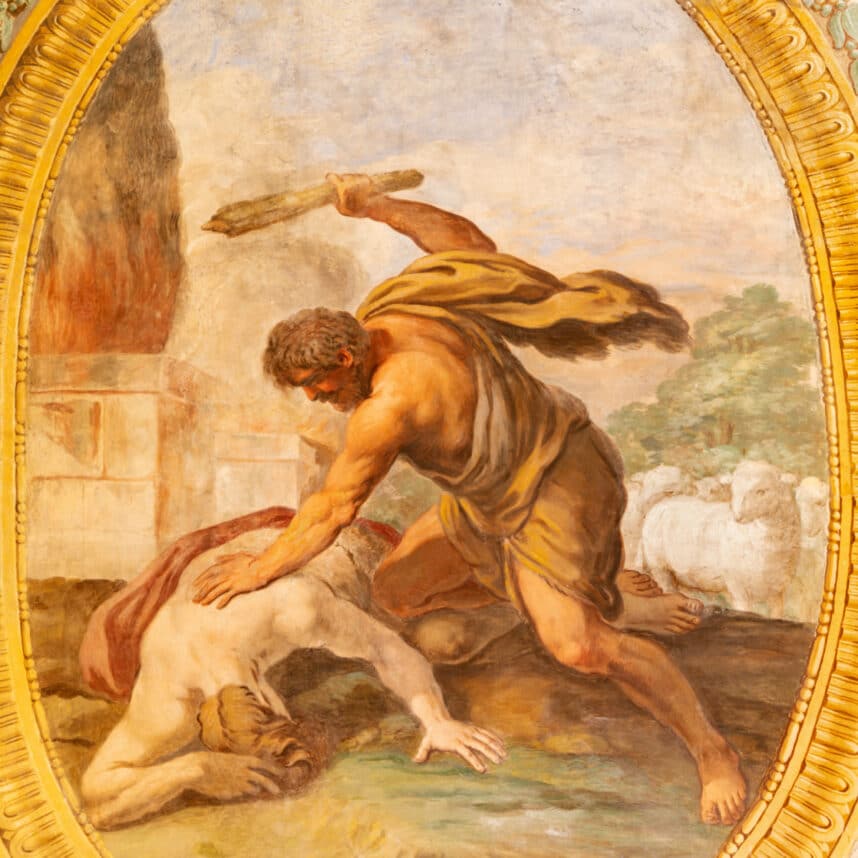
The Earth was Filled with Hamas – Lawless Violence
When people complain about reading the Bible, they often point to the “begots.” “This one begot that one, and that one begot this one.”
The “begots” are worth a close reading, especially the first set in Genesis 4. The narrative in chapter four begins with Kayin (Cain) murdering his brother Hevel (Abel), apparently from envy. The God-character in chapter four curses Kayin with eternal wandering. Kayin complains that anyone who sees him will kill him.
Appropriately so, we might add, as we see from a later teaching (Genesis 9:6), that anyone who sheds human blood, his blood shall be shed.
That law apparently not being in force yet, God places on a Kayin an “ote” – a sign, that anyone who kills Kayin will suffer seven-fold, so that no one who finds Kayin will strike him.
It seems that God was young then and didn’t quite grasp the consequences of allowing murderers to roam about freely.
It seems that God was young then and didn’t quite grasp the consequences of allowing murderers to roam about freely.
Satisfied with this promise of immunity for the consequences of murder, Kayin, we are told, leaves God’s presence and heads east of Eden (Genesis 4:16). Being a murderer does not seem to harm Kayin’s love life; he marries and bears children.
One of his descendants, Lemech (the Lemech of Genesis chapter four, not chapter five), boasts to his wives:
Adah and Zillah hear my voice, wives of Lemech give ear to my speech:
I have murdered someone for wounding me, a child for bruising me.
If Kayin is avenged seven-fold, then Lemech seventy-seven fold!
Lemech seems to think that the immunity promised to Kayin is grandfathered to Lemech, but only strengthened. Perhaps, in the background, the God of Genesis chapter four is beginning to doubt himself and his grants of immunity for murder.
I can imagine the heavy heart of the author of these passages, writing things down from previous generations, perhaps wondering, “What has gone so terribly wrong with human beings, that they kill a child for suffering a bruise, and that their sense of immunity for the crime is seventy-seven fold?”
Perhaps it is this same author who speaks for a heartbroken God at the end of the first Torah portion. The author writes (Genesis 6:5-7):
Adonai saw how great human wickedness was upon the earth, how the shape of every thought devised by his heart was evil, all the time. And Adonai regretted that He had made the human being on the earth, and was saddened unto his heart.
And Adonai said, “I shall wipe out the human being whom I have created upon the earth, man to breast, to crawling ones and flying ones, because I regret having made them.
In the next Torah portion, Noah, God notes (Genesis 6:11):
The earth has become corrupted before Elohim, and the earth is filled with Hamas (lawless violence).
At that point, Elohim decides to flood the earth (Genesis 6:13):
God said to Noah, “I have decided to put an end to all flesh, for the earth is filled with Hamas (lawless violence); because of them, I am about to destroy them with the earth.
Noah is saved and humanity is regenerated, but it seems clear, that until this very day, there are those who decide to follow the ways of Kayin and Lemech, people who decide to follow the ways of Hamas (lawless violence).
In the Biblical narrative, God regrets having wiped out nearly all of humanity, and places a rainbow in the sky to remind him to restrain himself when the urge arises.
As an interpreter of the Bible, I think that insomuch as this God of the Bible might actually exist, that God is sorely tempted to wipe out humanity again and again. This God of the Bible, I reckon, recalls the conversation with Abraham when Abraham was pleading on behalf of Sodom and Gomorrah, “For the sake of 10 I will not destroy the city” (Genesis 18). The reader must remember than in the end God could not find the 10 righteous ones in the city, who would protest the evils of Sodom and Gomorrah. The cities were destroyed.
Perhaps we today can learn something from this, as we look at the rainbow, recall Kayin and Lemech, the mistaken immunity given to murderers, and the law that whoever sheds human blood, his blood will be shed.
Perhaps instead wiping out all of humanity, if we would just, in every generation, wipe out Hamas (and those who harbor them), the earth will eventually be cleansed of violence and the just and righteous can beget a generation of peace.
Perhaps instead wiping out all of humanity, if we would just, in every generation, wipe out Hamas (and those who harbor them), the earth will eventually be cleansed of violence and the just and righteous can beget a generation of peace.


































 More news and opinions than at a Shabbat dinner, right in your inbox.
More news and opinions than at a Shabbat dinner, right in your inbox.